Thabit Mohammed, a 36-year-old resident of Fariya community in Maiduguri, has been making an impact on the lives of displaced girls in Borno State, northeast Nigeria, for years. Thabit had left the country for a decade but returned home amidst the Boko Haram crisis.
“When I came back home in 2015, my community had no school and children were no longer attending classes. The school I knew before I left the country was lost to the insurgents’ attacks. It was burnt down, and the abandoned classrooms were turned into public toilets and dumping grounds for passers-by and members of the community,” he said.
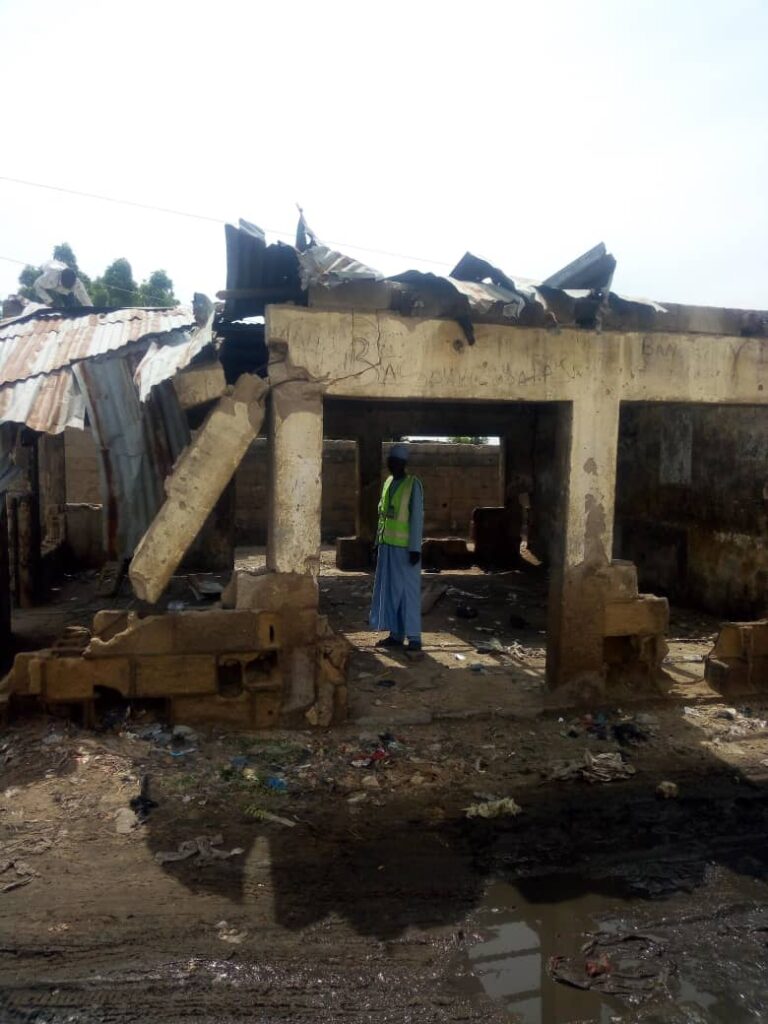
Low-income countries are experiencing low enrollment of girls in pre-tertiary education. UNESCO figures put girls of schooling age who are out of school at 129 million. While gender parity may have been achieved on a general scale worldwide (63 per cent female and 67 per cent male), a lot is still left to be desired in education completion as only 36 per cent of girls complete school as against 44 per cent of boys in the same low-income countries, says UNESCO.
“These gaps appear more glaring in countries affected by fragility, conflict and violence (2.5 times more prevalent) and assume a 90 per cent more likely status of being female secondary school dropouts.”
Access to Education
Before the reconstruction and rehabilitation of the classrooms, Thabit began imparting knowledge to displaced girls.
Gradually, he started with night classes commencing from 6:30 pm-9:00 pm every day. Later, he started to take hours in the day as well. He focused his attention on vulnerable girls because they can easily be lured and are prone to sexual abuse in the community, he says. Education may build their resistance against unwanted advances.
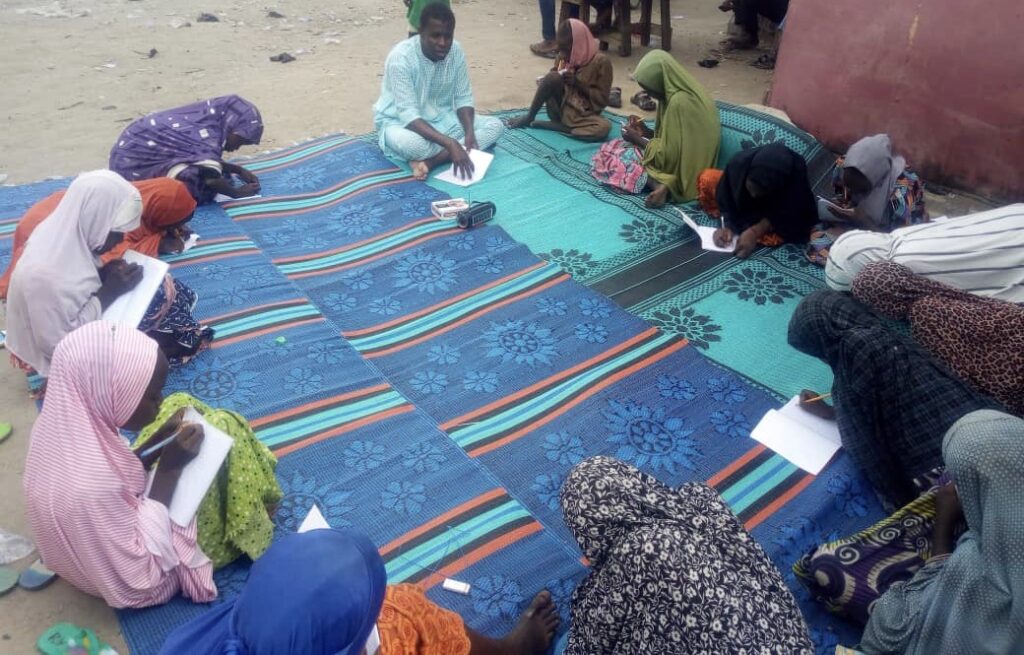
Zainab Ahmad, a 12-year-old displaced child from Gajiram, said, “Before displacement, I didn’t know how to read nor write, but after we found ourselves here in Maiduguri as a result of the Boko Haram crisis, I was able to read and write and even construct a sentence. I am very excited about attending the classes.”
Maryam, the girl’s mother, says, “I always dreamt of my daughter attending school, but due to financial conditions, I was unable to send her to school. Her father was murdered by the terrorists. I am only able to provide food. However, my minimal source of income cannot cater for my child’s schooling needs. I am really grateful now that my daughter is attending school.”
“In Dikwa LGA, we don’t attend school. I didn’t know what school was or what it looked like until we came here. I saw my friends attending Mallam Thabit’s classes, and I was eager to join, but I had to seek my parents’ permission. I was among those that graduated. I can read, write, and speak in English now,” a 15-year-old girl from Dikwa narrated.

Hassan, her guardian, told HumAngle that “my daughter could not read nor write, but after attending these classes, she is now capable of reading and writing, to the extent of reading and replying to text messages I receive on my phone.”
Aisha Mohammed Adam, another displaced young girl, said, “In my community Marte, we have Government schools, but I could not attend the school due to fear of Boko Haram. I was happy when I started attending the classes which I dreamt of. I can now read and write and even read sign boards.”
Mohammed Adam, her father, said, “Before, I didn’t know the value of educating a girl. I only believed that when a girl has reached the age of puberty, she should be married off. Now that I have realised the importance of education, my daughter can read and write and even fill out forms which we cannot do. Her education has brought positive change to us.”
According to Thabit, “the community lacked teachers and classrooms. I was the only person that had Western education. The only option I had was to develop the community through the educational system. I bought cement and zinc to repair a few classrooms so that this community could have access to education,” he explained.
Interventions by humanitarian agencies reached Thabit’s community. Unfortunately, many residents could not express their yearnings and needs because of ignorance.
“I saw Save the Children International’s and some government agencies’ vehicles moving into my community, searching for the community head’s house. Upon reaching the community head, he said they don’t need anything here, their children will only attend Islamic schools, and Western education is prohibited. I was able to communicate with the dignitaries that visited the site on the issues ravaging the community, which are a lack of access to education and classrooms. I made emphasis and ensured these classrooms are reconstructed and fenced back again,” Thabit told HumAngle.
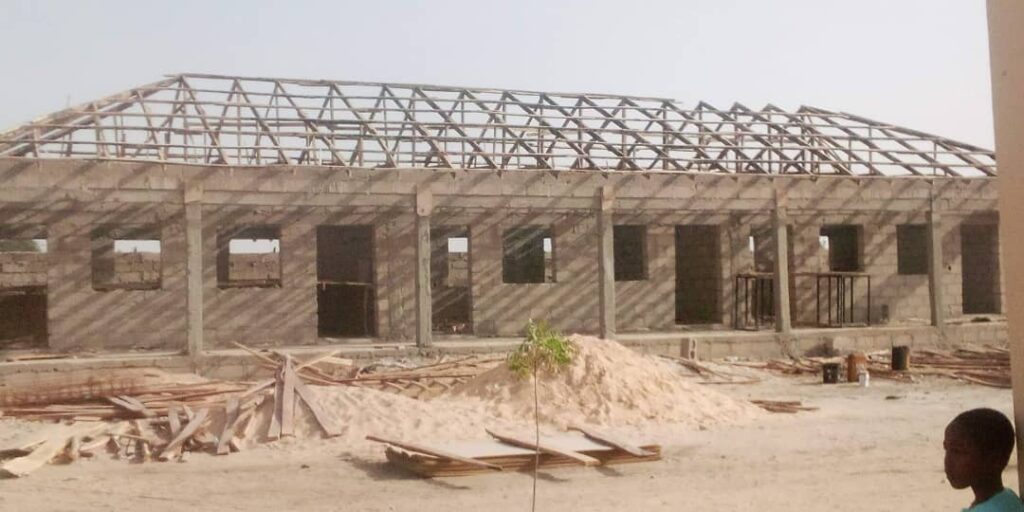
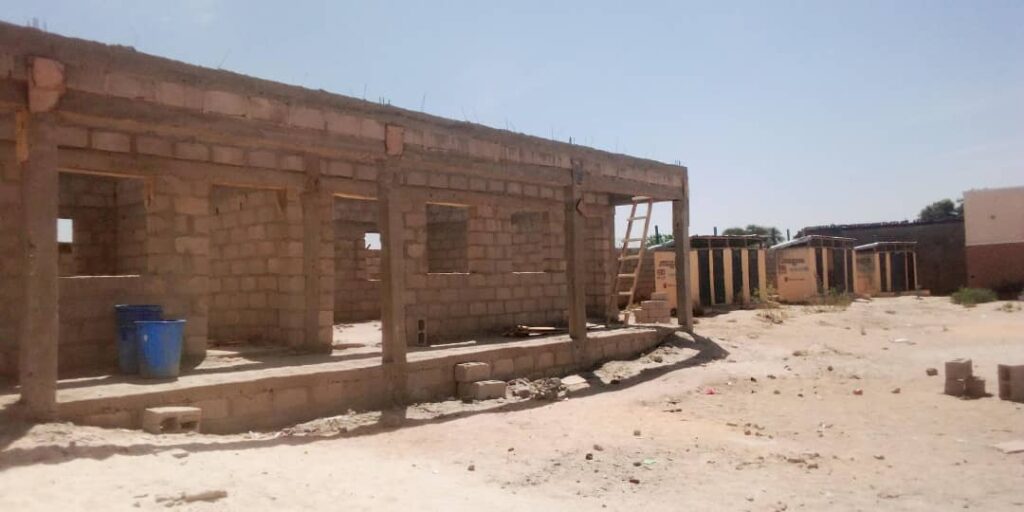
After rebuilding, residents of the community started enrolling their children in school to acquire knowledge. About 3,820 children were enrolled. This was achieved through massive advocacy by the residents to parents on the significance of educating children.
Thabit continued his voluntary work towards ensuring the displaced girls had access to education after the school was fully rebuilt.
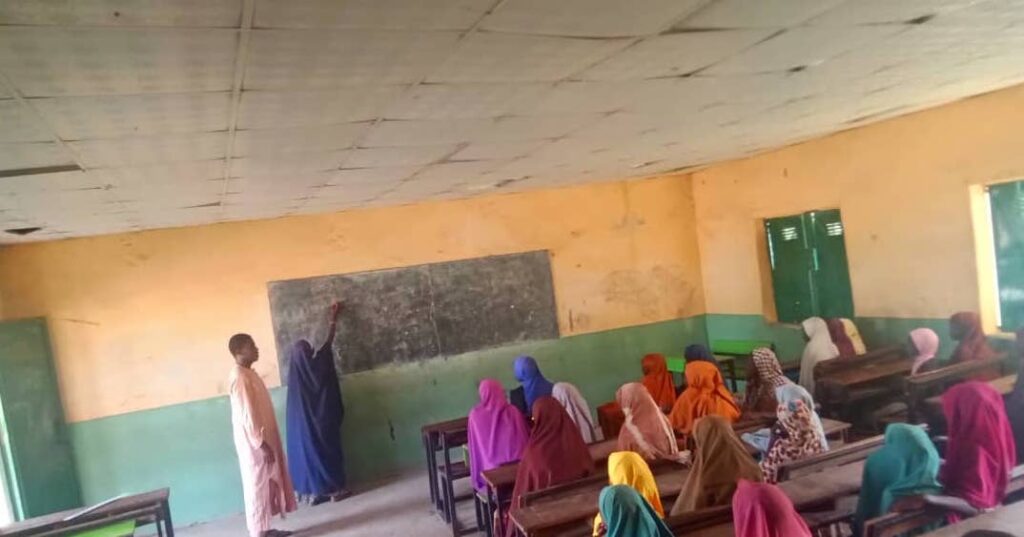
One of the community’s religious leaders, Lawan Ali, said the school only had two classrooms and was lost to Boko Haram attacks. “The school was abandoned for quite a while before activities resumed with the help of this generous resident. It gladdens me now that my children are attending classes.”
“I graduated 175 displaced girls in batches from 2018, 2019, and last year. I thank God I fulfilled what I dreamt of giving to the community. The school is now being counted as one of the promising primary schools in Jere community. The school can now boast of having upto 30 teachers and enough learning facilities,” he added.
Thabit shared with HumAngle the difficulties he encountered in this journey. “The girls that reached the age of puberty, their attention is being carried away by the men of the community. They come to classes late and are not even focused.”
There are also difficulties posed by the parents.
“Some of the parents will not allow the girls to come to class unless they hawk and bring money before they come,” he explained.
Thabit was further supported by Save the Children Organization as a volunteer teacher to continue addressing the barriers to girl-child education. This encouraged him to put more effort, as his contribution to the community is not going unrecognized, he says.
Aisha Tijjani Jidda is a 2023 HumAngle Accountability Fellow from Borno, Nigeria.
Support Our Journalism
There are millions of ordinary people affected by conflict in Africa whose stories are missing in the mainstream media. HumAngle is determined to tell those challenging and under-reported stories, hoping that the people impacted by these conflicts will find the safety and security they deserve.
To ensure that we continue to provide public service coverage, we have a small favour to ask you. We want you to be part of our journalistic endeavour by contributing a token to us.
Your donation will further promote a robust, free, and independent media.

